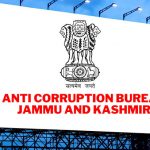There is probably no harm in framing new laws and rules to govern but more and more laws indicate something alarming: the roots of corruption are deep and widespread in a society. To combat this menace and its varied consequences, certain actionable steps– leave aside laws on paper — are paramount. Jammu and Kashmir is no exception. The union territory confronts multiple issues and challenges, a byproduct of deep-seated corruption. That we seem to have normalized. Why do not we care?
Granted that no government possess a magic wand to weed out corrupt practices root and branch, but every government does own the resources to examplify good governance. Those indulging in wrong doings behind desks only to feather their own nests are not thin on the ground in this part of the world. Such a situation creates mistrust in governance; births insecurity and alienation in populace; worse, it undermines the government.
Under a democratic set-up, constructive criticism, aimed at the national development, is not anything outrageous or uncalled for. Needless to say that the country’s parliament is the highest institution to decide things for the nation’s progress, prosperity and peace. No bill is passed without thorough discussion on its various aspects. And recently, the parliament passed a Waqf Bill into an act which has not settled well with some political and some social circles of Jammu and Kashmir as well.
If there is no harm in questioning the act, the best course is to bring to fore its logical and pragmatic consequences in the larger interest of the society. Viewed dispassionately, the act can lead to inclusivity and social cohesion in the modern times. Since one is free to pursue one’s religion constitutionally here (article 25- 28), every religious community is entitled to safeguard its cultural identity and structures with the national development and integrity not losing relevance.
In Jammu and Kashmir, the political leadership and the clergy has its job cut out; there are legions of issues and challenges tormenting people in everyday life and crushing them, in particular, the weak or the powerless every moment. The pathetic scenario can potentially be done away with provided the political and religious leadership rises above petty matters, giving precedence to the issues general public faces practically.
To begin with, the population of the highly educated and job seeking youth is on the rise. Jammu & Kashmir recorded the highest unemployment rate of 32% among the unemployed in the 15-29 age groups only in urban areas according to the latest quarterly Periodic Labour Force Survey (PLFS). It is for the political leadership to find employment avenues for the youth. How come there are thousands of the employed — draining the exchequer– having gone past their superannuation age! Cases of the sons attending field work in place of the aged employees galore. Should such employees not be sent home for fresh recruitment on merit?
Some relatives of the deceased pensioners, supposedly in cahoots with certain quarters, purportedly are continuing to draw pension floating norms, a heinous crime needing immediate attention. And is not it an open challenge to the legal apparatus? A thorough and reliable probe is the key to unearth such cases. Only those in power can stem the tide; doing so shall come as a ray of hope for social justice to the powerless.
Corruption, in its various forms, has literally become a way of life here. Does the rulebook allow it? If yes, then why frame laws in the first place? The Anti-corruption Bureau is appreciably doing well against the corrupt. Not putting off the corruption tap is a license to the powerful hands fleecing a common person brazenly. The death of the legal fear is an eye opener, calling for a robust counter response from the policy makers. No civilized society can allow this barbarism, dog-eat-dog state of affairs, to take root.
Unchecked corruption has eroded our social fabric as well. Ironically, there is wide acceptance for many cases of social injustice, including by parents misusing their powers at times to deprive some children of the property rights and dignified life unilaterally. It is the pulpit which can play a pivotal role in sermonizing people regarding property disputes; also about the harmless separation from the joint family setup. A sermon must be balanced, not lopsided. Political leadership can frame strict laws to keep parents excesses at bay. No son, daughter or daughter-in-law is a slave. Anyone can wrong us regardless of age and status and powers and relationship.
Another issue is the growing use and trade of narcotic drugs. No doubt, the government over the course of some past years has combated the menace significantly. But the challenge does exist. Both the clergy and the political leadership are powerful enough to defeat this evil. If not they, then who? The institutional response to the social threat lacks teeth.
Speaking of education, particularly school education, it must defeat the challenges if there are in terms of infrastructure, less effective work culture and beauracratic huddles. If our political machinery faithfully rises to the occasion, things are bound to improve. The non- transfer of ReT category teachers is reportedly doing more harm than good on the ground.
While the religious leadership can well approach the issues on moral grounds, the political leadership can offer a joint face to prevent further deterioration of the legal framework in everyday life. Anything less can backfire sooner or later.
Above all, every human being is morally and legally duty-bound to oppose injustice committed against humanity in any shape and form anywhere across the globe. In this noble cause, religion, region, status, caste, class or wealth should never be a yardstick. The most horrific torture and trouble is meted out by humans to fellow humans.
(Author is RK columnist and teacher by profession. Feedback: [email protected])









